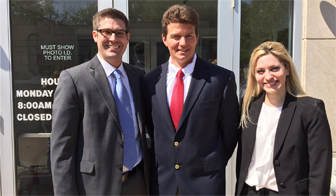Many married couples might cringe at the thought of working together, but Houston corporate lawyers Darin Schultz and Christina Vitale treasure the opportunity.
A few weeks ago, the husband-wife duo helped a man who was previously sentenced to life in prison for a nonviolent drug offense walk out of a courtroom as a free man.
Scott Walker’s release from prison is the finale of a successful pro bono effort that Schultz and Vitale have fought for seven years and spent “at least” 500 hours on.

“It gave me hope that these great attorneys were working on my case,” Walker told The Texas Lawbook during a call from Illinois. “For the rest of my life, I will kind of feel a connection with them over this. They will always stay with me.”
Walker’s release also marks one of the latest success stories in the Justice Department’s renewed effort to reform the criminal justice system by granting clemency to non-violent drug offenders who received harsh sentences from the War on Drugs era that would be more lenient had they been sentenced under modern law.
“There is a large bipartisan push to try to rectify the situation, and it is becoming fairly common,” said Schultz, a corporate finance partner at Vinson & Elkins. “Federal prisons are quite full with people serving mandatory minimum drug sentences. There certainly is a tremendous need for pro bono counsel to step up and help those individuals.”
“The approach taken before was you lock them up and throw away the key and forget about it,” said Vitale, a litigation associate at Morgan Lewis. “I’m happy to see that’s changing, but I think it could be changed faster.”
This isn’t the only pro bono case that the couple has worked on together. Before they wed in 2010, Schultz and Vitale secured $41,000 in denied VA benefits for a World War II veteran who suffered from a back condition, as well as future benefits of more than $500 per month.
Schultz said the pro bono work has become a productive outlet for his and Vitale’s shared passion for the law.
“To be able to combine our legal talents and disciplines and bring that to bear for someone in need is not only a great way to spend our professional lives, but our personal lives,” Schultz said.

“Plus, Darin finally saw me in court,” Vitale added.
On April 25, Vitale argued the motion the couple drafted together that ultimately freed Walker at a hearing in Illinois federal court.
Getting Involved
Walker, 44, was arrested and convicted in his early twenties for his involvement in a drug dealer ring in Southern Illinois. Walker transported drugs from Arizona to Illinois to sell to support his methamphetamine addiction. In 1999, a jury found him guilty of narcotics trafficking. Because of the sentencing guidelines at the time, the judge who handled Walker’s sentencing had no choice but to give him life in prison without parole.
Schultz and Vitale got involved in Walker’s case through a referral by David Zlotnick, a professor at the Roger Williams University School of Law in Washington, D.C. Zlotnick conducted a federal sentencing study that involved surveying judges who were dismayed with the mandatory minimum sentences they were forced to give to nonviolent drug offenders.
One of the judges Zlotnick interviewed was U.S. District Judge J. Phil Gilbert of the Southern District of Illinois, who presided over Walker’s case. Judge Gilbert was so disturbed by Walker’s life sentence that he agreed to write a letter to President Obama in support of Walker’s commutation petition, which Shultz and Vitale filed in 2011.
“Over the years, the absolute nature of this sentence has often weighed on my mind and I have sometimes invoked [Walker’s] case as one of the most difficult moments in my judicial career,” Judge Gibson wrote in the 2011 letter.
All of Walker’s co-defendants received a much shorter sentence than he did, including the leader of the drug dealer ring, who had two prior drug felony convictions. While his co-defendants agreed to a shorter sentence in exchange for cooperating with the government, Gilbert wrote in his letter that Walker’s first attorney never conveyed that a plea bargain was an option.
Plus, Walker was the model inmate for federal prison, the judge wrote, who has so far spent his life sentence reading more than 1,000 books, renewing his family ties, staying sober and taking academic and vocational courses.
“His unbroken spirit in the face of a life sentence is an example of the human spirit at its strongest.”
Equally disturbed, Zlotnick reached out to Washington, D.C. V&E partner Bill Lawler, who Zlotnick worked with in his prosecutor days, to see if the firm could get involved in Walker’s clemency petition. Schultz, then an associate in V&E’s Washington office, ended up leading the effort.
“As David (Zlotnick) jokes, he promised himself he wouldn’t take up the cause for any individual he met through his survey, but he found Scott’s case to be something particularly compelling,” Schultz said.

Being a “somewhat dorky legal couple,” as Schultz puts it, Vitale quickly signed on as co-counsel in the case after the two spent time talking about the cases they were working on.
The case was also of interest to Vitale because she knew Zlotnick from her law school days when she served as his research assistant, she said.
The Process
The success of Walker’s release was twofold, Schultz and Vitale said. While the motion the couple filed was crucial, they were able to file it because of changes in the law that occurred after they took on the case with the intent to gain Walker’s freedom via his clemency petition.
When Schultz and Vitale got involved in 2009, the groundbreaking U.S. Supreme Court decision, U.S. v. Booker, was already in effect. Booker allowed judges for the first time to use the federal sentencing guidelines as just that – guidelines – and exercise their own discretion for how long a defendant should be sentenced based on the facts of the individual case. But because the decision was not retroactive, it did not apply to Walker.
This caused the husband and wife to first focus their efforts on Walker’s commutation petition, which they filed in 2011, to secure his release. But because President Obama is the only person with the authority to grant clemency and the administration has been flooded with thousands of petitions, Walker’s petition went unanswered.
“We think the petition generally speaking was well-received,” Schultz said. “Frankly, it could have been one of those things where it was lost in the federal shuffle. It could have been next in line for the president to sign, but we just don’t know.”
Vitale and Schultz both agreed the clemency process was the most challenging part of this case, describing it as a “black hole.
“Each time President Obama would grant someone else’s clemency petition but not ours, it was a blow each time,” Vitale said. “There’s a lack of transparency into the process and knowing where it is, why it’s held up… what the issue was if there even was an issue. Maybe it was random, or [Walker’s] was at the bottom of the pile.”
They got a break in 2014, when the U.S. Sentencing Commission reduced the penalties for many nonviolent drug crimes and later unanimously voted to apply the reductions retroactively. This led to the release of 6,000 prisoners in November 2015. Walker was not one of them, but the rule change automatically reduced his sentence from life without parole to 30 years.
Schultz and Vitale said this law change created an anomaly in Walker’s case, since Walker’s original sentence did not include the normally imposed condition of supervised release. The anomaly opened the door for Schultz and Vitale to file a motion for corrected sentence.
When the husband-wife team argued the motion on April 25 in front of Judge Gilbert, he agreed to amend Walker’s sentence to the time he had already served (nearly 20 years) plus a three-year term of supervised release, which resulted in his immediate discharge from custody.
A ‘Surreal’ Release
Vitale described the experience as “surreal” because the hearing took place in the same courtroom that Walker was sentenced in almost 20 years ago and was conducted by the same judge, and attended by the same family members.
Even more surreal to Walker is actually being back out in the world.
“I’m just getting used to being out,” Walker said.
Walker is currently living with his sister and brother-in-law. He has spent his first days of freedom enjoying the “simpler things in life”: catching up with friends and family, working on obtaining his commercial driver’s license and discovering the addictive nature of “Game of Thrones.” He attended his niece’s graduation over the weekend and will get to see his 23-year-old daughter get married, who postponed her wedding after she found out the prospect of her father getting released.
“I got locked up when she was four, so I missed her first day of school, graduation, Sweet 16… at least now I’m going to get to be there when she gets married, and that’s some consolation for me.”
Walker said the biggest lesson he learned while behind bars was the fact that “even if you don’t care” how your actions affect yourself, “your actions affect those closest to you.
“I feel the sentence I received was just unreal and harsh, and I don’t think it was warranted, but my actions caused my family suffering,” he said.
© 2014 The Texas Lawbook. Content of The Texas Lawbook is controlled and protected by specific licensing agreements with our subscribers and under federal copyright laws. Any distribution of this content without the consent of The Texas Lawbook is prohibited.
If you see any inaccuracy in any article in The Texas Lawbook, please contact us. Our goal is content that is 100% true and accurate. Thank you.
